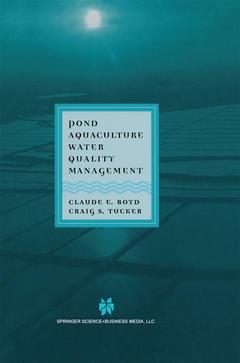Pond Aquaculture Water Quality Management, Softcover reprint of the original 1st ed. 1998
Langue : Anglais
Auteurs : Boyd Claude E., Tucker C.S.

The efficient and profitable production of fish, crustaceans, and other aquatic organisms in aquaculture depends on a suitable environment in which they can reproduce and grow. Because those organisms live in water, the major environ mental concern within the culture system is water quality. Water supplies for aquaculture systems may naturally be oflow quality or polluted by human activity, but in most instances, the primary reason for water quality impairment is the culture activity itself. Manures, fertilizers, and feeds applied to ponds to enhance production only can be partially converted to animal biomass. Thus, at moderate and high production levels, the inputs of nutrients and organic matter to culture units may exceed the assimilative capacity of the ecosystems. The result is deteriorating water quality which stresses the culture species, and stress leads to poor growth, greater incidence of disease, increased mortality, and low produc tion. Effluents from aquaculture systems can cause pollution of receiving waters, and pollution entering ponds in source water or chemicals added to ponds for management purposes can contaminate aquacultural products. Thus, water quality in aquaculture extends into the arenas of environmental protection and food quality and safety. A considerable body of literature on water quality management in aquaculture has been accumulated over the past 50 years. The first attempt to compile this information was a small book entitled Water Quality in Warmwater Fish Ponds (Boyd I 979a).
Preface. Selected Atomic Weights. Customary Metric Conversion Factors. 1. Water Quality and Aquaculture: Preliminary Considerations. 2. Ecology of Aquaculture Ponds. 3. Water Quality Requirements. 4. Water Use. 5. Liming. 6. Fertilization. 7. Aeration. 8. Water Circulation. 9. Turbidity and Appearance of Water. 10. Aquatic Weed Control. 11. Off-Flavors and Harmful Algae. 12. Pollution. 13. Chemical, Physical, and Biological Treatments. 14. Waste Management. 15. Measurement of Water Quality. 16. Sustainability and Environmental Issues. References. Index.
Date de parution : 09-2012
Ouvrage de 700 p.
15.5x23.5 cm
Thèmes de Pond Aquaculture Water Quality Management :
Mots-clés :
algae; aquaculture; aquatic animals; ecology; environment; environmental protection; fish; food; growth; information; pollution; sustainability
© 2024 LAVOISIER S.A.S.



